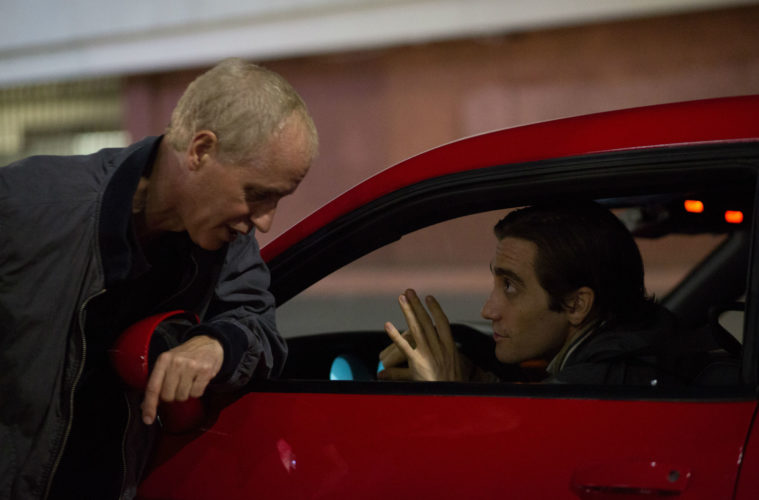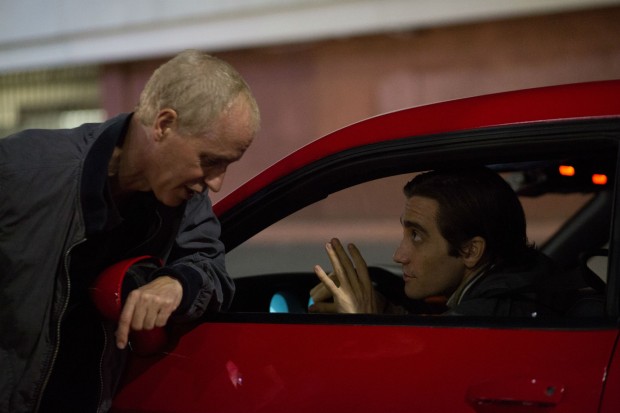
Currently in wide release, Nightcrawler is a relentless film that pummels one with emotions. At times its brilliantly frightening in its implications, but it can also be thrilling to watch; there’s laughter, shock, and in some cases, one can simply be appalled. However, the curiosity of what Jake Gyllenhaal’s Lou is going to do next pervades every scene. While this is writer-director Dan Gilroy’s directorial debut, he’s no stranger to Hollywood productions with a slew of screenplay credits to films you’d likely recognize, from The Fall to The Bourne Legacy. Setting a high bar from the start, Nightcrawler makes for a stunning debut.
After the U.S. premiere at Fantastic Fest, I had a chance to sit down with Gilroy to talk about just how quickly the film came together. He’s just as happy as you’d expect him to be when the normal timeline is five to seven years between a script being turned in and a film actually being made. We also discuss why they chose Lou’s Dodge Challenger as his car of choice, the connection to Hot Wheels, how he and Gyllenhaal developed the character and focused on a coyote as inspiration, and the drive to succeed. Check it out below in full as the conversation kicks off.
The Film Stage: Let me put this right here to record us.
Dan Gilroy: Is that the new iPhone?
Oh, no. This is the Samsung Galaxy Note 3. It’s about the same size though.
Ah, had you heard about them bending? What’s that about?
Well, people were sitting on their phone.
[Gilroy gives incredulous look]
Who puts an expensive piece of technology in your back pocket and then sits on it? It’s going to be hard for you to answer your phone.
Totally. No, this to me [points to phone] is like a family member. I try to treat it with real respect.
Oh, yeah! I love my phone.
It’s important to you.
Yeah. It’s a part of me.
You do love your phone?
Yeah.
I totally love my phone. I have a personal relationship with this thing. We both brought out phones. You’re on that as much as you interact with anybody during the day.
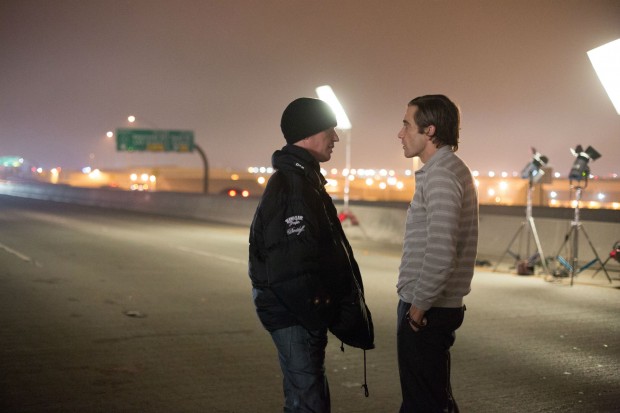
Definitely. So, let’s jump into it. This is your directorial debut.
Yes it is.
And you are married to Rene Russo.
I’m married to Rene Russo. I’m a lucky guy.
[Laughs] So it seems like this came together fairly quickly. I hadn’t heard much about it and then all of a sudden I heard all this hype. It was out there. It was ready. It was finished. It didn’t seem to take long.
It’s really true. I’ll tell you really quickly. In my experience, the films that I’ve gotten done on average — from the time I finish writing to the time that they get made — take anywhere from five to 10 years, more like seven to eight years.
And part of that is just the studio system.
Oh, yeah!
It may not be ready to go until all of a sudden they have an available slot two years from now and they’re like, “Hey, we have to fill this.”
And that regime is left. Then the actor has left. There’s 15 things. So it takes forever. So what happened here was I wrote the spec, and it was a very personal script for me on a lot of levels, and I was very fortunate in the sense that I got a very, very favorable reaction very quickly. So I sent it to my agency and because it’s a character study, people right away are going, “Who can play this part?” The agents started. Jake was at the top of the list but wasn’t available because he was going to do Into the Woods. But within a couple of months that fell apart and I flew to Atlanta. I met with Jake. He came on board.
Were you going to go a different route? I hate to go down that rabbit hole.
There were different actors. There were people you flirt with and think about. But no, the only serious step we ever took was with Jake. Once we had Jake we very quickly went through a round of looking for financing and we had a number. We would make it for below $10 million. So with Jake and below $10 million and the crew that we were bringing in… people like [cinematographer] Robert Elswit, my brother Tony [Gilroy] was a producer, my brother John [Gilroy] is the editor. The financiers felt comfortable. So very quickly the money came through. Very quickly Jake’s schedule opened up. So we shot it very quickly — something like six weeks in LA.
Then we edited it right away; my brother John is a great editor and we only had 16 weeks post so we cut it. Then we went to Cannes and they were doing some more presales and we had a trailer. The buzz on the movie started to become so strong that a bidding war broke out over the trailer. At Cannes, unexpectedly, we got picked up by Open Road as a distributor who had a slot for the fall. So everything just sort of snowballed [laughs] extraordinarily quickly in what I felt was a very positive way. I wanted the movie to come out in the fall. I wanted the movie to premiere internationally at the Toronto International Film Festival. So to me it was a dream. It was a very odd experience to have something happen that quickly.
You’re on one side of production. But even your wife, Rene, I’m sure it was fascinating for her to watch how quickly things went through.
Yeah!
She’s a veteran and she’s been through so many films. I’m sure it was wild.
She was going, “What!? We’re shooting next week? What are you talking about?”
Yeah. “Don’t we need to talk about it more?”
It was happening very fast. It was so exciting to have things happen quickly.
I’ve got to say, having watched it, I can see why everything moved so fast.
Thank you.
One thing about Jake’s character in particular, I almost feel like he has no social skills except what he’s read about online.
That’s right.
As soon as anything goes wrong, he shows that he doesn’t have any social skills.
Right, right.
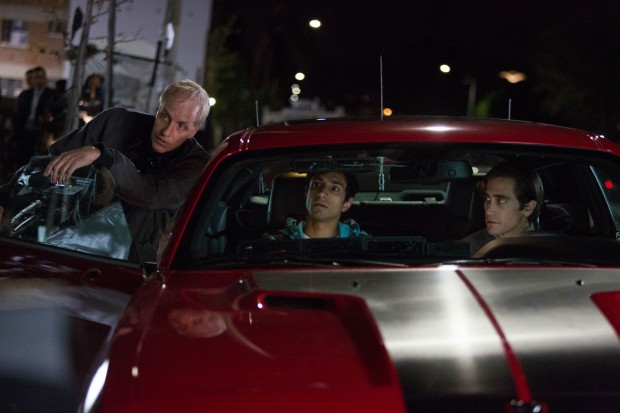
I love that but you also have to nail down his speech and his cadence. It’s very particular. He’s methodical about the way he says things and delivers them. Part of that is the script and part of that I imagine is what he’s bringing to it. Does that take a long time to nail or does he bring so much out of the gate?
I wrote the script extraordinarily specifically. Jake never changed a word. Jake followed commas! That said, we decided, in our first meeting, that we were going to collaborate and rehearse together. So we rehearsed for three months before, in which Jake explored so many different variations of what was on the page. So many different back stories to what might be going on in the character at that moment. It was all starting to drift in a really positive way towards finding the humanity of the character. Trying to find the elements of the character that made it difficult for the viewer to look at the character and go, “Oh, he’s just a sociopath. This is a movie about a sociopath,” which is what we never wanted. What Jake was always looking for is if you watch him, he’s engaging, in an odd but strangely human way. What the character embodies in a lot of ways is a touchstone experience for a lot of people: the desire to want to succeed. I think it’s an identifiable door for people to go through. So when you’re watching the character, as odd as he is at times, he’s always doing something that is identifiable in the sense that he’s trying to climb the ladder. Which, for better or worse, we’re all hammered with from grade school.
You’ve got to succeed.
Yeah. We also felt that he’s a lonely character and ultimately a tragic character. He desperately wants to connect and communicate. But everything comes out a couple of tragic degrees off. I think there’s a pathos in that but I also think there’s an odd humor to that. I’ve watched it in a large theater and there’s an absurdity to what he says at times, given the situation. It becomes an interesting character study because you don’t know what’s going on with the character. Is he coming from someplace of loneliness? Is he coming from some place of social dysfunction? Is he coming from a desire to succeed that is legitimate? Is he really a sociopath?
I think it’s a great line that you mentioned is that his desire to succeed is the number one thing on his mind. Which means when he runs through certain situations, he’s going to say, “Does this benefit me to interfere? Does it benefit me to do anything else except film it?” A lot of times, it’s going to be, “Film it!” I don’t need to interfere. It’s not going to help my career.
He looks at each situation in its own light. I think brilliance is one of his traits. Brilliant in the way that a predator is brilliant. You can look at a predator and say, “It’s just a killer.” But predators understand their prey on a level that we’ll never know. They understand how they smell and where they feed. Their habits and what they do. I think Lou understands people the way a lion understands a gazelle. He studies them. It’s instinct and he studies. I use the animal symbol in a way because Jake and I always thought of Lou as a nocturnal animal that came down out of the hills at night to feed. And we specifically thought of him as a coyote. What’s interesting, I think, about attributes of an animal is that there is no emotional attachment to violence with an animal. An animal will kill without any build-up of emotion and without any aftermath of emotion. It’s just something that needs to be done to survive. I think Lou’s character similarly gets no joy out of violence. Maybe that is the distinction between a sociopath. He doesn’t get any joy. It’s just something that needs to be done to survive and to succeed.
I’ve gotta ask, because I’m a car guy, I love the fact that you bring in the Dodge Challenger. It’s an SRT?
Yeah. And that’s not the color of the car. You can’t get…
That red?
We had to wrap that car in red. It comes in a burnt orange. We wrapped that car in red because I wanted the cherry red. [Laughs] To me it looked like a Hot Wheels car.
Oh, absolutely.
It’s a fantasy car.
It makes the same noise that a kid would make. Brrrrrr.
Exactly!
I’m curious about the choice of that car versus anything else. I mean, he’s such a hyper intelligent guy. It almost seems like he would go with a four-wheel drive sports car or something more than just a straight line car.
We see the character as an innocent child, in a lot of ways. And like a child, when you bring up Hot Wheels. If you look closely at his apartment, in the background there’s a couple of little toys. There’s a toy dinosaur and a couple of other things. We were going to lean more heavily on that but it never came through in the movie. The idea that he’s into toys. He’s like a child. So the car in a way was like a wish fulfillment for a child. So he is like a child. There’s something strangely innocent… or naive about the character. So the car for him was like the full-scale version of the Hot Wheels car. I don’t think we made that connection as strong as maybe was in the script but I think an element of it comes through, maybe.
I think it definitely does. Well, I’ve got to wrap with you.
Oh, thanks, man. Great talking to you.
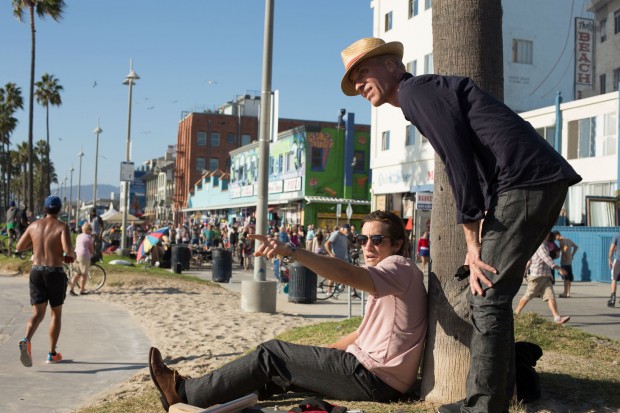
Nightcrawler is now in theaters.

